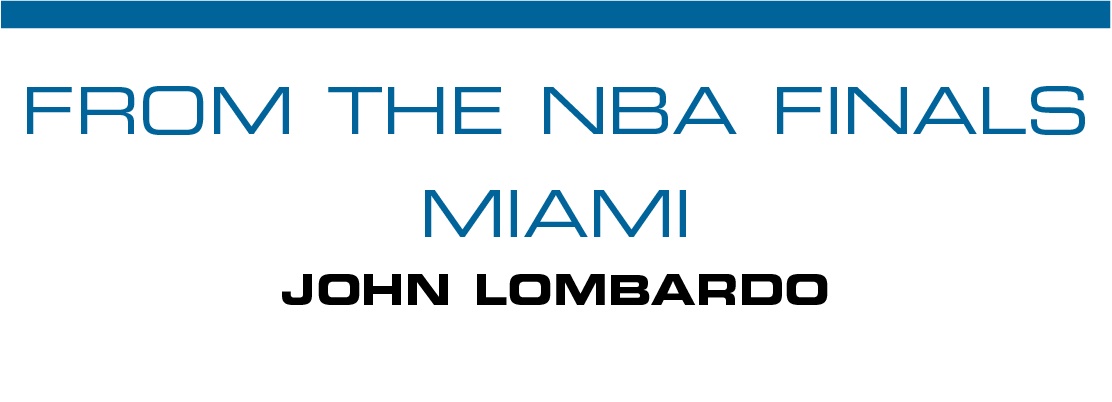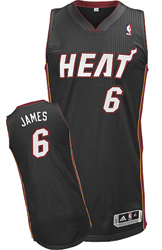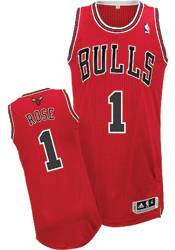The growing threat of an NBA lockout hasn’t yet scared off many season-ticket buyers, as the league enters June with a season-ticket renewal rate ranging between 75 percent and 80 percent. That renewal rate comes on the heels of the league setting a full-season-ticket sales record last year.
NBA Deputy Commissioner
Adam Silver said prior to Game 1 of the Finals in Miami that the league’s season-ticket refund policy to be offered in the event of a lockout has helped maintain its renewal business.
“We are not surprised [by the renewal rate],” he said.
The NBA is promising full refunds plus interest to season-ticket holders for any games lost to a lockout.
Chris Granger, NBA executive vice president of team marketing and business operations, said one-third of the league’s 30 teams already have sold at least 1,000 new full-season tickets, including the Memphis Grizzlies, Los Angeles Clippers and Washington Wizards.
“The pacing is as strong as we have ever seen at this point in the year,” Granger said. “They are not the usual suspects.”
League executives said they are not yet expecting a major drop in season-ticket sales leading up to a potential work stoppage.
“People are still entranced with the stellar playoffs,” Granger said. “We will continue to sell during the coming weeks and months.”
Despite the strong season-ticket renewal rate, Silver said the NBA is feeling some damage from the looming lockout in other areas.
“We haven’t felt a season-ticket impact, but it is bad for business,” he said. “Our marketing partners run summer campaigns and buy media in advance, so the uncertainty already has had an impact.”
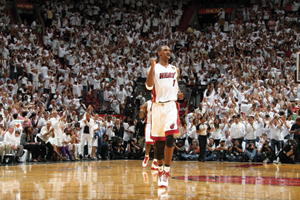 |
NBAE / GETTY IMAGES
The hot, hot Heat is looking at selling naming rights to areas in AmericanAirlines Arena. |
■ LEVERAGING SUCCESS: It has been a blockbuster season both on and off the court for the LeBron James-led Miami Heat, and now the team is flexing its market dominance with a strategy that could include selling naming rights to areas inside AmericanAirlines Arena.
“We are working on some things in the arena that have naming-rights components,” said Eric Woolworth, Heat president of business operations.
Plans could include selling the naming rights for the upper- and lower-level bowl areas of AmericanAirlines Arena, though Woolworth declined to provide more specifics.
“We have a lot of digital signage, so if it makes sense to some partners, we would sell [naming rights to areas inside the arena],” Woolworth said.
Woolworth would not disclose the team’s specific sponsorship base but said the Heat has a 100 percent sponsorship renewal rate.
“We have had a record year and everyone has renewed,” he said.
As Woolworth considers selling additional arena deals, the team is profiting from the recent launch of its Heat Priority Access Club, a program that allows fans to jump to the head of the line for playoff tickets as well as giving priority to members who are put on a season-ticket waiting list. The three-tiered program gives members who pay $250, $150 or $50 first crack at buying season tickets, which are sold out.
Paying for a priority to buy season tickets is common in the NFL but not so much in the NBA.
Woolworth would not say how many people have paid for the access program.
“After we finished renewals, we transitioned people [to the access program], which has a waiting list component to it,” he said.
■ HEAT NOT SWEATING BALLPARK: In past years, the opening of a new $500 million Florida Marlins stadium would pose at least some consternation for the Heat, as both teams battle for local corporate dollars. But with the Heat and James dominating the NBA and the local market, Woolworth said there is no concern about the added competition when the Marlins’ new ballpark opens next year in downtown Miami.
“Of all the organizations in town, the Marlins are our friends,” he said. “They buy seats with us and we buy from them and we let them come on our concourse to sell season tickets. On some level, you can think about limited sponsorship dollars, but at the moment, we aren’t sweating it. We don’t view the new ballpark as a threat.”
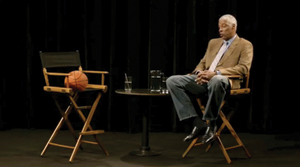 |
| Will the NBA bounce the ball? Its talking basketball, here interviewing Julius Erving in the current postseason campaign, has gotten mixed reviews. |
■ THE FUTURE OF THE TALKING BALL: From “I Love This Game” to “Where Amazing Happens,” the NBA’s institutional ad campaigns have been well-received and critical successes over the years. Not so with the current postseason campaign from Goodby Silverstein & Partners, in which a talking basketball relays stories of past playoff triumphs and “interviews” the likes of Magic Johnson and Julius Erving about their championship memories. There will be about 10 of them before it’s all over, with additional creative on social media and other sites.
It’s a polarizing campaign: No one has a benign opinion about it, and, as is the case with most advertising, everyone’s an expert.
The concept was originally brought to the league after last year’s playoffs, and NBA marketers liked the idea enough that they wanted to save it for the playoffs this year.
“We wanted something that could tell the story of players, playoffs and history, and the ball was the perfect vehicle,” said Danny Meiseles, executive vice president and executive producer of NBA Entertainment. “The ball itself speaks to the game. It is the one thing all players have in common: that they have this relationship, in a sense, with the ball since they started playing.”
As for the somewhat disconcerting feeling at first glance of an anthropomorphic Spalding during an NBA playoff game? Meiseles points out that brands as big as McDonald’s, CarMax and Reebok all have current ads that include lemons, cars and sneaker soles talking. The lemon even sings the McDonald’s jingle. So, he maintains, a talking ball is not as unusual as you might think.
As for the future of this campaign?
“We’re not there yet, but after the season, we will see if it achieved our goals and what our goals are moving forward,” Meiseles said.
■ MERCHANDISE METRICS: This year’s Finals matchup between Dallas and Miami is bolstering NBA merchandise sales that are expected to soar past last year’s levels.
While James moving from Cleveland to South Beach fueled sales of his jersey — he took over the top spot this year from Kobe Bryant in jersey sales — other factors have pushed the leaguewide increase, including the emergence of Chicago Bulls star and league MVP Derrick Rose.
“Last year, we had a double-digit increase, but we should end the season well over 20 percent,” said Sal LaRocca, executive vice president of the NBA’s global merchandising group during a break from entertaining clients during Game 1 of the Finals.
LaRocca would not disclose total league merchandise sales. The Licensing Letter’s 2011 Sports Licensing Report said the NBA during the 2010 year generated $1.93 billion in gross sales for its licensed merchandise in the United States and Canada.
This year’s projected 20 percent-plus sales growth comes in a year in which the NBA shuttered its New York Fifth Avenue store in February after operating the retail shop since 1998.
“It was terrific to have a store, but if there was ever a season not to have one, this was it,” LaRocca said.
The NBA Store is expected to open a new store in a temporary location on Fifth Avenue with a 12- to 18-month lease.
The league then will look for a more permanent location, also expected to be on Fifth Avenue.
■ REVENUE SHARING UPDATE: Against the backdrop of collective-bargaining talks are continued discussions among NBA owners to retool the league’s revenue-sharing system that currently includes very limited sharing of local gate revenue among the NBA’s 30 teams.
“We continue to talk,” said Joel Litvin, president of league operations for the NBA before Game 1 of the Finals.
Litvin would not reveal any specific details of proposed new revenue-sharing systems but said that the system will be drastically different from the current arrangement that has revenue sharing tied to local market performance.
Staff writer Terry Lefton contributed to this report.


